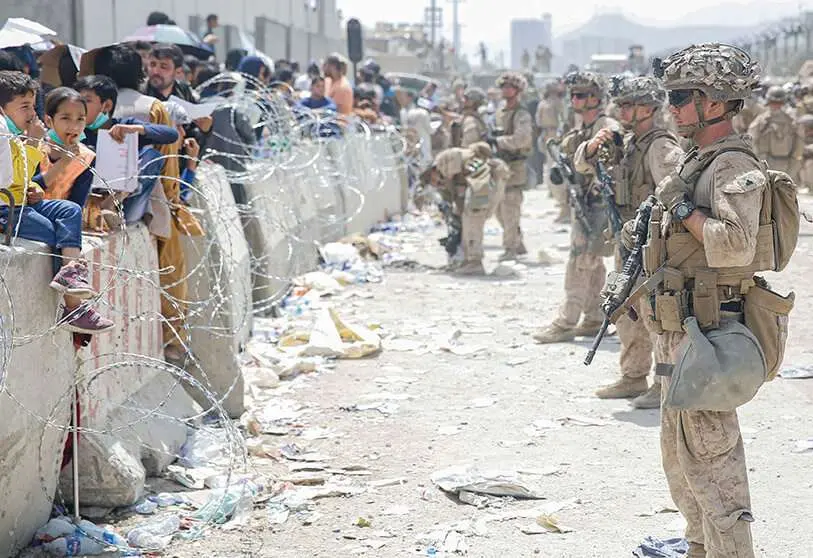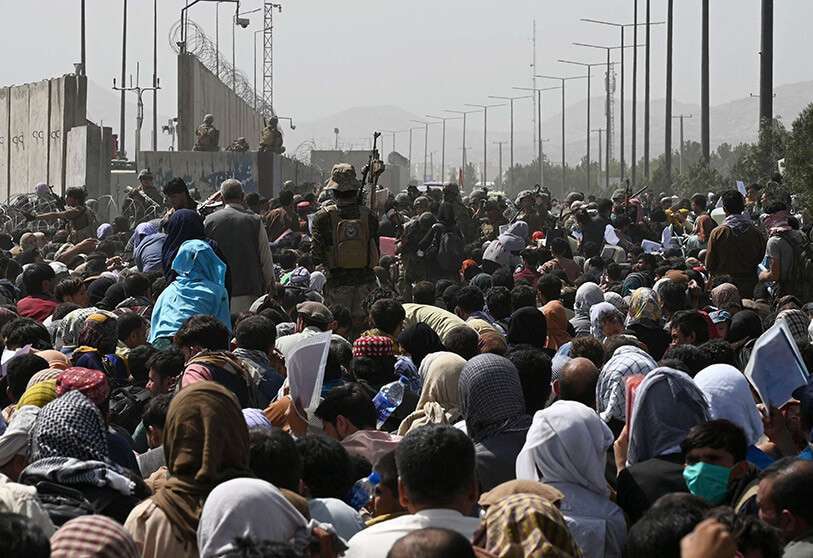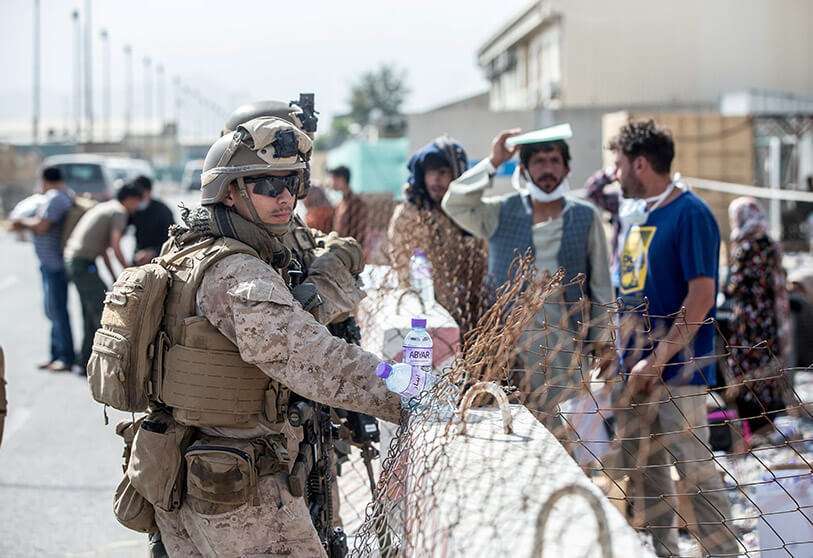Afghanistan, drifts and aftermath (III)

In most of the conflicts in which the main protagonist is in rebellion with the international community, its sources of foreign financing are usually closed or cancelled, international credits are denied or withheld, commercial exchanges are suppressed, the accounts of the country or its leaders are frozen, even in the so-called tax havens, and an attempt is made to ensure that this economic cooptation begins to bear fruit as soon as possible, to reduce its closedness and come closer to international requirements and standards, since no country is capable of surviving for a long period of time solely with its own resources.
An interesting and quite good theory, but difficult or even impossible to apply when the country in question - as in the case of Afghanistan - has overt or covert support from unorthodox powers or followers of international agreements (China, Russia, Iran, Saudi Arabia, Qatar and Pakistan, among others); when it generates products that are highly coveted and in demand abroad (drugs and rare earths or Lithium); depending on its geostrategic situation and because the international memory is usually quite lax and, once such a decision has been taken, a way out of the impasse is already being studied in parallel. I do not believe that the announced economic support to Afghanistan will last long and will not be really effective.

My professional experiences as Head of the Civil Military Cooperation Section (CIMIC) in the NATO Regional Command South, taught me the necessity and the excellent results of carrying out, before and during any conflict, the so-called Area Studies. These studies provide a lot of data about the country, its culture, history, religion, climate, political trends, foreign ties, armed forces, population and a long etcetera. Data that, due to their incalculable value, are also highly appreciated by the intelligence community and, above all, when it comes to making decisions for any type of operational planning or major actions.
I am sure, after twenty years on the ground, executing all kinds of operations and with such large and wide deployments, the US and coalition intelligence men and CIMICs will have done their job well. But nevertheless, the whole thing has failed like a house of cards poorly supported on its foundation; indicating that possibly their reports were not taken into consideration, the Command erroneously ignored them or what I find much more dangerous and probable, it was the civilian authorities who insisted on making their cloak a cloak, without taking into account the value and considerations arising from such military analysis.

Another serious mistake, which is never learned from, because in a few years I have been able to verify that it is repeated too often; they cost thousands of lives, hundreds or billions to society, diminish the prestige of international Organizations or Alliances and deceive a people who are used and massacred as many times as necessary.
We should consider the obligatory nature of making political leaders answer judicially before international tribunals when they adopt ill-considered decisions, with serious consequences or for doing so against the well-founded criteria of the truly prepared.

If this had not been the case, the definition, the follow-up and the departure of the mission would have been very different. I am absolutely convinced that in those documents they would have defined real extraction and evacuation plans to avoid having to resort to the disaster of this forced evacuation, without any plan by the majority of the contingents, who left the theater on their own without any consideration whatsoever. The height of international shame is what we witnessed yesterday when a whole G-7, with the power and economic, military and deterrent capacity it has, was not able to bend the will of jihadist terrorists to maintain August 31 as the deadline for extraction and foreign presence.
The response of the Taliban was well known and expected, no one can or should be surprised, so it was essential to have complete and updated lists and to have advanced the extraction with order, security and concert before chaos took over Kabul and the city and its people went mad. Especially when most of the Afghans to be extracted do not reside in Kabul.

This conflict shows, once again, that the eternal conflict of prevalence and final possibilities in the struggle between democracies against serious dictatorships and deeply rooted communist regimes is not simple and does not usually produce easy and permanent results.
Imposing democracy by means of cannon shots and soldiers, despite many years of insisting on the same territory, is not very feasible and gives way to countries in which it does not fully convince, feel more and more capable and confident, because they know that their thoughts, desires and approaches will not be extirpated. Especially when the UNSC is blocked by two of them (China and Russia).
In view of all the above discredit and the problems that will arise with the distribution of refugees, it can be said that the world has fallen and that its structures are cracking or collapsing; no one is capable of anything anymore, we are left to the whims of the terrorists and their claws everywhere, as long as they do not try to do so.

China, a dictatorial and communist country, is the clearest example of this reality; it has grown a lot as a country and as an economic and military power and is getting closer and closer to becoming, in the near future, the natural successor of the USA in world leadership.
Powers such as Russia, Turkey, Iran, Pakistan and Saudi Arabia, among many others, have been buying and following its idea and are trying to recover their past splendors, which is why they are increasingly farther away from adopting democratic regimes or are closer to abandoning them definitively, if they had ever adopted them.

It is not that the idea of US military withdrawal is a recent invention of President Biden; already with Obama we have been hearing and seeing various plans to abandon missions, territories, allies and civilian population in several areas and countries in conflict despite having been part of their bilateral alliances or having used them as a shock force or cannon fodder in combat against superior or very cruel forces when it comes to fighting. It is clear that the US and its people are sick and tired of always being the ones who put most of the economic and military efforts and the number of casualties in all the conflicts in which they intervene (their own or acquired).
But it is no less true that this is the fee that a country must pay to maintain its world leadership, as is the fact that nowadays the geostrategic importance of different parts of the world, their energy resources or the need to keep certain countries aligned varies at a faster rate than in the past. Everything is changing rapidly and among these changes are the new priorities of the United States when it comes to paying greater attention or devoting significant resources to them.

After the latest U.S. withdrawals in recent years, including Afghanistan, one might ask the following question: where is the U.S. going or directing its efforts? There are several answers and all of them require a lot of resources to be covered with guarantees of success.
There is talk that climate change will soon make the Arctic practically navigable all year round, which will greatly shorten the communication routes between continents and allow the extraction of its many resources under the waters or ice of today; a situation in which China and Russia are also very interested.
Another great aspiration is the provision of economic and human resources to the recently created aerospace forces, in competition with other similar Russian, Chinese and even Indian forces. All countries are striving to become the first to dominate the space spectrum because they understand that whoever succeeds will dominate the world.
No one is unaware of the need to control the vast Asia-Pacific territory where China has been investing heavily for years to create artificial islands and exponentially increase its naval air capacity with the possibility of relying on them to control the waters of the South China Sea. This situation endangers several US allies in the area, such as South Korea and Japan, as well as relations with India, which is also in the process of greatly increasing its military capacity.

Last but not least, the US sees that its backyard, Central and South America, is becoming a hen house in turmoil, with populist Bolivarian communist governments growing and sustaining themselves in strategic countries for fuel, drugs, massive emigration and serving as a business and shelter for traditional enemies such as China, Russia and Iran. It is therefore to be expected that he will soon have to devote greater attention and efforts to the area than he has done to date. Possibly, Biden felt he was the happiest man in the world until a few days ago; Trump's vocal but insistent echoes were gradually fading; the vaccination of his citizens was progressing by leaps and bounds; the death rate from the virus was dropping; the economy was in the process of maintenance or recovery and soon he would celebrate the 20th anniversary of 9/11 as a great triumph as a mission accomplished, the withdrawal from Afghanistan completed and everyone safe at home.
Lack of foresight at the highest levels, haste due to the proximity of that date, overconfidence in their false or self-serving intelligence reports, and the Taliban's rigid negotiating not to facilitate the extraction of collaborators, have caused the US image both globally and internally to fall to the ground. Russia and China are celebrating this failure and are waiting for further developments and the moment to throw it in their faces.
The US is a somewhat more serious and different country than the rest, so the mistakes of its presidents and other senior civilian and military leaders are studied in the light of the Senate and in the courts of Justice; therefore, we will soon see moves in that direction. Vice President Kamala Harris, who was living peacefully in the shadow of old Joe waiting for her chance to peacefully succeed him, is starting to soak her beard because she may jump into the arena much sooner than expected. In short, Afghanistan may easily have become the tomb of the US in general and Biden in particular.

The situation in which we are leaving the country after the disastrous escape is one of real chaos, despite the Taliban propaganda efforts to hide the reality and repress themselves while there are still some media, cameras and cell phones that can record their abuses and atrocities. I am sure that when the free media disappears and the communications via internet and cell phones are under the absolute control of the Taliban, the situation will change a lot and we can be sure that the civil war in Afghanistan may become inevitable; in which, thanks to the weapons that have been "transferred" to the Taliban, the rest of Afghans will bear the brunt.
With this I end, for the moment, a document that has tried to analyze, in a preliminary way and without much data yet, the possible derivations and aftermath of the crisis in Afghanistan. I know that after some time I will write again on the subject because there will be more aftermath; although I fear that society will have almost forgotten it and it will no longer be of great interest in spite of the many casualties and massacres that have occurred and will occur there on the non-evacuees, simply for being a relative of someone who worked as auxiliary personnel of the "foreign devils" who twenty years ago dared to invade their land or for not accepting their religious precepts.
But, I would not like to close it without honoring the military and auxiliary personnel who have generously left their lives there or along the way (some have been under my direct orders). People, who were sent to their death by forced or strange reasons of inexperienced rulers; and also to reproach the politicians who still continue acting blindly or who take advantage of the bitterness of the situations to take front page photos and give themselves self propaganda with mendacious statements, such as this one that has stuck in my mind "In Spain we are in the hard and the hard times".

